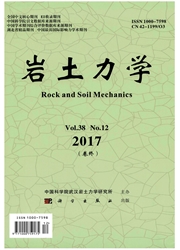

 中文摘要:
中文摘要:
将饱和软黏土中钻孔灌注桩孔壁稳定性问题视为半无限体内柱形孔的卸荷收缩问题。基于SMP准则改进的修正剑桥模型,采用应力空间变换方法推导了柱孔卸荷收缩问题的弹塑性解答,得出了孔壁临塑支护荷载和孔壁颈缩的解析表达式。在此基础上,提出了维持孔壁稳定所需最小泥浆重度和孔壁稳定安全系数的计算方法,并对影响钻孔稳定性的因素进行了研究。研究结果表明,饱和软黏土中钻孔灌注桩孔壁卸荷屈服后,孔壁周围土体处于弹塑性状态,钻孔颈缩量大,孔壁稳定安全系数较小;在泥浆支护条件下,饱和软黏土中钻孔灌注桩孔壁稳定性取决于土体重度、超固结比、土体内摩擦角及泥浆重度等因素,而与钻孔深度和孔径无关;土体超固结比和内摩擦角越大,维持钻孔稳定所需的临界支护压力和最小泥浆重度越小。在实际工程中,应在保证最小泥浆重度的条件下结合工程具体情况合理选取泥浆比例。
 英文摘要:
英文摘要:
The stability problem of the bored pile hole wall in saturated soft clay is taken as the unloading shrinkage problem of a cylinder in the semi-infinite space. According to the SMP criterion-based Cam-clay model, the elastoplastic solutions of the cylindrical unload shrinkage problem are derived using the stress transformed method, and the analytic expressions for the critical plastic pressure and the hole-wall shrinkage are obtained. On this basis, the methods are applied to calculate the minimum slurry density and the borehole safety factor, and the factors influencing borehole stability are analyzed in details. The results show that, after the bored pile hole-wall yield, the soil element around the wall is in the elastoplastic state, with the hole-wall shrinkage increasing and the borehole safety factor decreasing. Under the mud supporting condition, the stability of the bored pile hole-wall is dependent on the soil density, over consolidation ratio, internal friction angle and the slurry density, etc., and independent of the hole diameter and the hole depth. The larger the over consolidation ratio and the friction angle, the smaller the critical support pressure and the minimum slurry density for maintaining bored pile hole-wall stable. In practice, the slurry density must be properly chosen so that the minimum slurry density is satisfied.
 同期刊论文项目
同期刊论文项目
 同项目期刊论文
同项目期刊论文
 期刊信息
期刊信息
